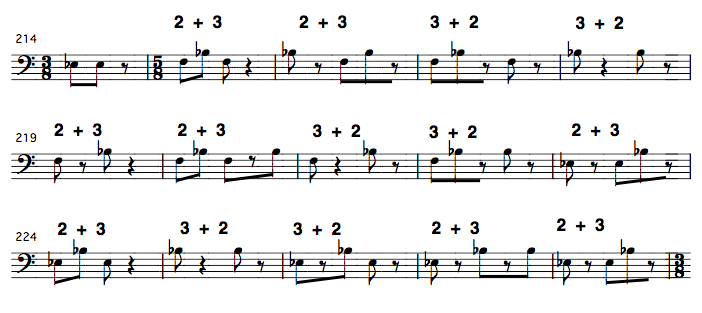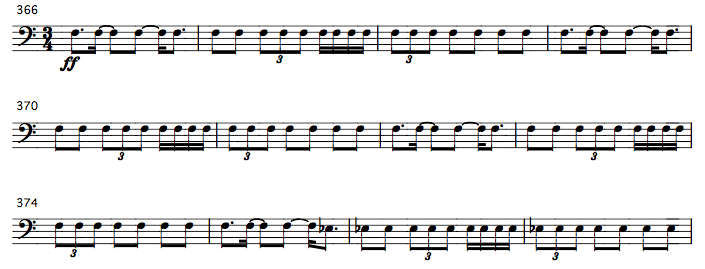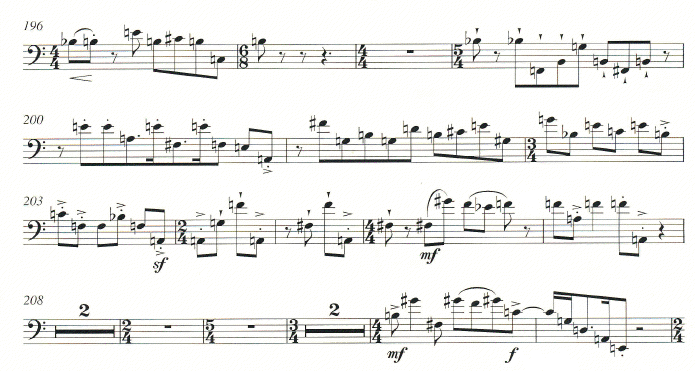I had a particularly unusual mute issue. I enlisted my daughter’s help to solve it.
Tag: Music
Recognizing Efficiency
I had one formal lesson with David Kirk while I was at Rice University. I still have the notes I took during and after that lesson, there’s a lot of great information in there. The one thing I remember most and think of frequently is his recommendation to “recognize effortlessness in others.” I prefer to think of efficiency rather than effortlessness as, I believe, sometimes a task will take some effort but can still be done in an efficient manner.
It’s something I try to do on a daily basis: observe others; recognize when someone is performing in a natural-looking, relaxed manner; and try to learn what I can from it (and also in the negative: recognizing when someone is displaying a lack of efficiency and taking lessons from that). This can happen in any situation, musical/cooking/at the gym/during a conversation, there are a lot of places to learn.
Here are some of my favorite musical examples of efficiency:
Nadia Sirota and Nico Muhly
Jim Pugh
Pieter Wispelwey
Peter Evans
Erin Lesser and Kate Soper
Last Saturday AWS played a concert of works written for us in Zankel Hall at Carnegie Hall. On the program were brand new pieces by John Orfe, Alarm Will Sound pianist, and Tyondai Braxton, in addition to recent works by Donnacha Dennehy and Charles Wuorinen and, at nearly eight years old, a downright ancient piece by David Lang.
John Orfe never disappoints with difficult writing (Parable of the Sower, the trombone quartet he wrote for Novus is no walk in the park, and his Chamber Symphony is quite a blow) and Journeyman is no exception. The piece is purely John. It is densely layered and uses extended harmony that will keep you guessing as to where it’s going but somehow sounds appropriate. Journeyman has great moments for the brass, including a fantastic trombone solo. Here’s a bit from the score:
![]()
Increase by David Lang is intense. The opening lulls you into a sense that the piece is going to be a walk in the park with a good four minutes of long tones. Then, suddenly, the mixed meter counting nightmare begins. Three minutes of 5/8, changing from 2+3 to 3+2 every other measure or so, doubled with a percussionist.

The ending is about another three minutes of nonstop rhythms, this time with little opportunity to breathe. I end up sneaking breaths in the repeated dotted eighths.

Tyondai’s new piece, Fly by Wire, is in the vein of math rock. The trombone part, however, requires little calculation. Mostly fat notes below the staff, Tyondai asked for as much sound as he could get from the brass turning the piece into “long, low and loud.” I got the opportunity to talk to him about the piece and recorded it for the AWS YouTube channel:
Big Spinoff, by Charles Wuorinen, is what it’s title implies, a spinoff for large ensemble of an earlier work, Spinoff written for violin, bass and percussion. The trombone part covers a large range, quickly. Leaps of greater than an octave happen frequently. I found that it was effective to play pretty lightly. It balanced the ensemble better and made those fast licks just a little easier to play in time.

The second half of the program was dedicated completely to Donnacha Dennehy’s work, “The Hunger.” Donnacha is creating an opera using The Great Famine as the subject. His depiction of it is incredible. Rather than a solely heartbreaking setting (which moments of the work definitely are), he uses the accounts of Asenath Nicholson, an American in Ireland at the time, as his source material. Her diaries are at times distinctly poignant and emotional and at other times distant and disconnected. Donnacha’s music reflects this. It sometimes sounds too “happy” to be a depiction of such sad events but somehow works wonderfully to create a vivid, effective image. Some of the movements use prerecorded music, all fantastic in their own right.
The trombone part is not wildly difficult but requires constant attention as the meter and it’s subdivision shift nearly every measure. Nearly always “in one” or “in two,” the music goes from 3/4 with four divisions per measure to 4/4 with four divisions per measure frequently. Tuning is the other challenge. Donnacha writes in a spectral style using the natural tuning of the harmonic series. The way he harmonizes these incredible pre-recorded sean-nós songs with spectral tuning is absolutely gorgeous.
